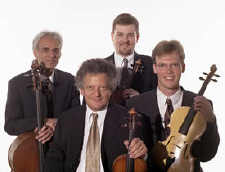

 |
 |
|
Carter Kyburz Harvey Arditti String Quartet Purcell Room 22 May 2005 Elliott Carter (b.1908) String Quartet No.5 Gilbert Nouno computer music realisation
This was an intriguing but, in its presentation, a frustrating recital, curated by George Benjamin but modestly without any of his own music. The Arditti Quartet, which is super-efficient in deciphering and mastering the most daunting new music, is scarcely 'atmospheric' on platform and no favours were done by having this concert played in darkness. Each of the three works runs without pause and only in the last (having studied the programme during the interval) was I able to find my bearings. It is all highly intellectual stuff (though Harvey claims psychic and spiritual connotations for his music) and it was frustrating not to be able to refer to the programme notes to try to find one's way. Many of us are subject to the vagaries of London's transport, arriving sometimes without time to spare, and most contemporary music fans seem to chat before concerts, rather than studying their often obtuse programme notes, q.v:- Carter's 5th quartet (1995) is structured in one continuous movement, but in several sections which break down as: Introduction Giocoso Interlude 1 Lento espressivo Interlude 2 Presto scorrevole Interlude 3 Allegro energico Interlude 4 Adagio sereno Interlude 5 Capriccioso Kyburz's (2004) quartet is composed of twelve clearly discernible sections: polyphonic music - solo: violin 1 - integrated music - polyphonic music - integrated music solo: cello - integrated music - polyphonic music - solo: viola - polyphonic music - solo: violin 2 integrated music Harvey's 4th quartet (2003) is divided into 'cycles', as if several lives are depicted, each dying and being reborn with traces of the previous ones. Repetition, transformation; architecture and narrative; construction, dissolution: these are the characteristics of both autonomous music and what it refers to outside itself. I enjoyed all the music but do not have expertise enough to analyse it on first hearing without having seen the scores. Elliott Carter is still flourishing and composing in his nineties and his 5th quartet seemed more lucid and accessible than any of his others since the splendid innovative large-scale first. Latterly Carter's music has been more concentrated; his major works tend to come out c.20 mins, as he told us long ago in an SBC talk. Kyburz's quartet has mercurial energy and is enjoyable as it passes moment to moment. I doubt if most of us would have known when we were in his 'integrated music' or the 'polyphonic music'; I look forward to possible CDs, which ought to have track timings for the sections clearly indicated in the inset notes. Both Carter and Kyburz write the sort of music that needs to be assimilated by repetition, as I have found with the complex yet rewarding music of the interesting and German composer Wieland Hoban, who writes considerately about amateur and expert performers and listeners. Jonathan Harvey is a man of Ircam, and in his lengthy Quartet No.4 the sound is transformed by 'live' electronics. In truth the underlying music seemed simpler and the whole less interesting than both the works heard in the first half. The electronic dressing up sounded to me decorative but superficial, disguising a poverty of invention in the substance of the music. It was quite easy to recognise the beginnings of the sections, as each started with (practically inaudible) bowing on the body and the tail-pieces of the instruments, and then a circular movement around the second violinist's strings. But the differences between those five sections eluded me at first hearing. I cannot feel so far that this electronically livened quartet has the originality and enduring vitality of George Crumb's Black Angels quartet or of the Portuguese composer Joao Pedro Oliveira's masterly Labirinto, premiered in Lisbon by the Arditti Quartet and not yet heard in UK.Extracts from reviews:- See Richard Whitehouse's analysis of the music in this concert for Classical Source - - the amplified music of George Crumb (Gnomic Variations, Music for a Summer Evening & his classic string quartet Black Angels) which demanded meticulous setting up (close to a conflagration when the fuses of the venerable Bilbao library blew during a nocturnal rehearsal!) All this music depended equally upon new and subtle sound combinations as on musical argument. For an experiment, Black Angels was played on electric string instruments (the cellist put his head right though his electric cello at one point when he had to simulate a viol !) and I doubt if such sounds had been heard in the hallowed surroundings of the Bilbao Library's concert hall before. - - - - The Arditti Quartet, British based but more likely to be encountered on its peripatetic travels, was acclaimed by a substantial audience in the Gulbenkian Grande Auditório. Labirinto by the Portuguese composer Joao Pedro Oliveira (b 1959) for amplified quartet and tape was one of the finest demonstrations of the potential of state-of-the-art electronics that I have heard. There was no distortion of string tone and the engaging, abstract tape music melded perfectly spatially, reaching back from the stage and making the whole more than the sum of its parts.
|